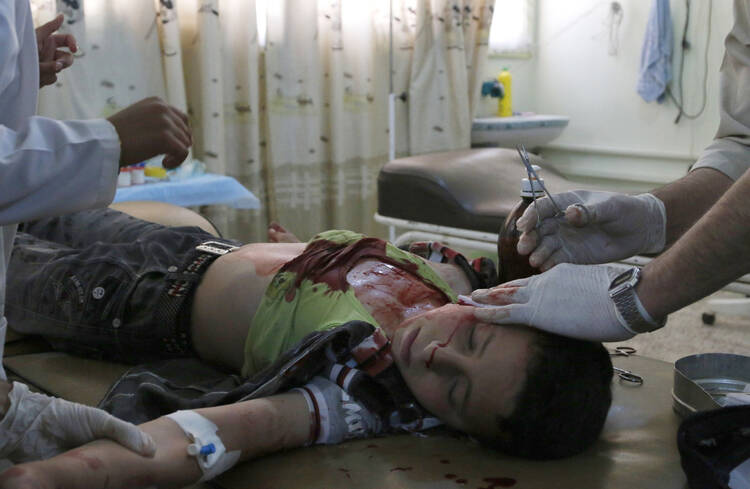The head of an international network of aid agencies has urged Syrian refugees sheltering in Jordan "not to lose hope," as the three-year conflict in their country shows no signs of letting up. Honduran Cardinal Oscar Rodriguez Maradiaga, president of Caritas Internationalis, met dozens of mainly Syrian Christian families on May 18.
Authorities here say more than 1 million Syrians are sheltering in neighboring Jordan, although only about 600,000 are registered with the United Nations. The country hosts the world's second-biggest refugee camp at Zaatari, near the border with Syria.
The cardinal told Catholic News Service that his message to the refugees was to "try to overcome all the difficulties, not with bitterness, but with hope that one day their beautiful land will achieve peace and they will be able to come back home."
He said he witnessed some of the clinical work done by Caritas Jordan, part of the Caritas network, among displaced Syrians.
Every year, Caritas Internationalis holds its plenary meetings in May, normally in Rome, but the cardinal said the organization decided to convene in Jordan to express its "solidarity with Caritas Middle East because they have been working always in such difficult conditions in Jerusalem, even in Syria and Iraq."
He added it was also an opportunity to express "our gratitude to Jordan" and "solidarity, especially with the refugees."
As a private organization, Caritas Jordan has one of the widest outreaches to both Syrian and Iraqi refugees in the country. It aids 320,000 Syrians, 25,000 Iraqis and 150,000 poor Jordanians with mainly medical care, said Wael Sulieman, who directs the national organization.
Cardinal Rodriguez Maradiaga said the world's attention must be drawn back once again to the Syrian conflict, which has created one of the worst humanitarian disasters in modern times.
The Honduran cardinal said that while Caritas has vast experience in dealing with natural disasters and emergency situations, the Syrian conflict has created a human crisis of enormous proportions.
"It is different helping people who have suffered from an earthquake or a tsunami than it is to help people who have suffered such killings, violence, and mutilations -- this is really another thing," he said.
"It's very important that the world focus on this region and try to help with its utmost to achieve peace," he said.
The United Nations and aid agencies say the Syrian conflict is the worst humanitarian disaster since the 1994 Rwandan genocide, with 6.5 million people displaced inside Syria and an additional 3 million seeking refuge outside the country. It is estimated that at least 150,000 people have died since the conflict began in March 2011.
"My home was bombed and everything I had in life has been lost," said Um Bassam, 50, a refugee from Syrian's eastern city of Deir el-Zour. "I have nothing to go back to in Syria."
She said although she has relatives living in America, she is hoping to join her children in finding asylum in Sweden.
She and the other refugees were invited to meet Cardinal Rodriguez Maradiaga at Our Lady of Peace Center, a sprawling facility run by the Catholic Church to aid people with disabilities and serve as a venue for youth activities. It is located 9 miles south of the Jordanian capital, Amman.
Syrian children played on swings and slides and drew colorful pictures, while their parents commiserated on the tragedy engulfing their homeland.
Father Imad Twal, who directs the center, said it educates disabled children regardless of religious background; many Muslims participate in the program. It also has hosted 150 Syrian families seeking asylum in the West.
Pope Francis will meet the children and asylum seekers when he visits the Baptismal Site in Jordan May 24 as part of his three-day Holy Land pilgrimage.
"We hope the pope will bring peace and stability to our troubled region," said Abu Reda, a Syrian businessman from Damascus. "We long to see Syria return to normal. We Christians want to find encouragement from the Holy Father being in our midst."
Another, Um Anas, added that she hoped the pope might help Syrian Christians find refuge in the West as the fighting back home continues.
Syrians will be among the 1,400 children to receive their first Holy Communion at the papal Mass at an Amman sport stadium May 24.
The parents of 9-year-old George of Aleppo, Syria, said their son will be among the lucky ones to receive his first Eucharist in the presence of Pope Francis.
"We were forced to flee the bombing and destruction of our hometown for Jordan. Here, life is difficult, with work not permitted by the authorities and at times, we have little to hope for," the Armenian woman said, who identified herself simply as Um George. "But George's Holy Communion has given us something so special to look forward to."
Cardinal Rodriguez Maradiaga said he believes Pope Francis will bring a message of hope to those who suffer.
"The messages of the pope are so direct, so clear. And especially he wants to express love," he told CNS, as he gazed at a fresco of the Good Shepherd in the church on the center's grounds. He said it reminded him of when Pope Francis visited a parish in Rome and put a sheep on his shoulders.
"This is like our Lord Jesus Christ. He is trying to do the same here in Jordan," he said.
"He is trying to make a symbol of putting all the Syrians, especially the refugees, on his shoulders in order to carry them, to help them to bear their crosses and to tell them not to lose hope," he added.








